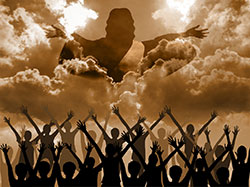SALT AND LIGHT
Are you wanting to be salt and light in an unflavorable (spelling is right) and dark world?.
Or...Are you wanting to be salt and light in an unflavorable (spelling is right) and dark world? Matthew 5:13-16
What are the prerequisites to being salt and light as a Christian? Why should we be salt and light if we have already received the light of the world?
Characteristics of Salt:
- Distinctive (If Christians are to be salt, it's important that our words, attitudes, and actions be distinctive from everyone else's).
- It enhances whatever it's added to; i.e. enhances and changes the flavor of food (Christians are to change the flavor of whatever environment they find ourselves in...i.e. instead of being influenced by our culture and what is politically correct, we are to influence our culture for good and our political positions to be biblically correct). Political posture and position for the Christian should always be in line with Biblical standards and all issues should be addressed by asking ourselves the question, "What Would Jesus Do?"
WE ARE TO BRING OUT THE BEST IN OUR CULTURE AND
ENVIRONMENT, JUST AS SALT BRINGS OUT THE BEST
FLAVOR OF FOOD.
- A Preservative, i.e. salt prevents food from spoiling (The Christian should act as a
preservative-being examples of purity in a decaying and putrefying world. By our
presence and action, decay and decadence should be arrested.
JESUS POINTS OUT THAT SALT THAT HAS LOST ITS FLAVOR IS WORTHLESS (NOTHING MORE THAN SAND).
IF CHRISTIANS ARE NOT ACTING AS SALT IN OUR WORLD, OUR CONTRIBUTIONS TO GOD'S KINGDOM ARE WORTHLESS.
- Drives Out Darkness (light of the sun overcomes darkness of night)...The Christians are to be the light that overcomes the darkness of the sin around us.
- Dries Out Mildew and Mold...As Christians we are to dry out the staleness of a dark and dreary life by offering others life that can only come through knowing the Light of the world, Jesus.
WE ARE NOT CALLED TO SHINE FOR OUR OWN BENEFIT AND BE MOTIVATED BY PERSONAL PRIDE OR PERSONAL GLORY. WE ARE TO REFLECT JESUS...NOT DRAWING ATTENTION TO OURSELVES...BUT TO JESUS, THE INEXTINGUISHABLE LIGHT OF THE WORLD.

 Many young adults never enter a sanctuary/church unless it is for
a wedding or a funeral. What are we missing?
It seems that young adults are willing to read a book on spiritual
things...or even attend a seminar or retreat that promises to link
them to God.
Many young adults never enter a sanctuary/church unless it is for
a wedding or a funeral. What are we missing?
It seems that young adults are willing to read a book on spiritual
things...or even attend a seminar or retreat that promises to link
them to God.
The questions...What, Why, Where and When?
- What are we not doing that we need to be doing? What are we doing that we don't need to be doing?
- Why the revolt, the rebellion, the refusal to be a consistent and faithful worker in the church?
- Where are the local churches failing to reach the young people? Where are the young people turning to for their spiritual needs?
- When did the church see the young adults turning away from the church as a sanctuary for peace and contentment?
"God intends us to penetrate the world. Christian salt has no business to remain snugly in elegant little ecclesiastical salt cellars; our place is to be rubbed into the secular community, as salt is rubbed into meat, to stop it going bad. And when society does go bad, we Christians tend to throw up our hands in pious horror and reproach the non-Christian world; but should we not rather reproach ourselves? One can hardly blame unsalted meat for going bad. It cannot do anything else. The real question to ask is: Where is the salt?"
John Stott in The Message of the Sermon on the Mount, p 65.
Can the church today recapture that kind of counter-cultural influence? Reggie McNeal writes, "The current spiritual awakening in North America lacks Christian content and file systems. This is the scary part of it. Left to their own imagination people will devise all sorts of crazy stuff about God, from New Age crystals to self-enlightenment. But this is also the opportunity of the current spiritual landscape.... Unfortunately, the North American church has lost its influence at this critical juncture. It has lost its influence because it has lost its identity. It has lost its identity because it has lost its mission."
Our Mission:
To Reach Our World for Christ!
To Teach Our Catch to Fish (Give to Receive to Give Again)!
To Win...Not Lose the Battle for Souls!
To Develop Commitment to the Cause for Christ!
Goals and Objectives to Complete Our Mission...
Humility with a Praying Heart, Spirit of Excellence, Commitment to Live With the Idea of Being More Like Christ...As We Journey in This Life!


Let's talk about this:
The appropriate response to the emerging world is a rebooting of the mission, a radical obedience to an ancient command, a loss of self rather than self-preoccupation, concern about service and sacrifice rather than concern about style (The Present Future, 18).
- Salt was a common product in Jesus' day. It was also valuable. Roman soldiers were sometimes paid in salt. Salt was used as a mark of friendship and symbol of loyalty. When an agreement was made between two parties, salt was frequently used to authenticate the deal. Today, we still have reminders of the value of salt. We sometimes speak of a person "not being worth his salt." The word "salary" literally means "salt money." So, one of the things we can say about being the salt of the earth is that followers of Jesus have a valuable function in the affairs of this world.
- This doesn't mean we necessarily operate in high social circles. Most of the first disciples were not powerful or rich or connected. As one writer says, "they were ordinarily ordinary" (Robinson, The Christian Salt and Light Company, 97). Yet Jesus called them the salt of the earth. Folks, it doesn't matter what your social, financial, or political status is. When Jesus Christ has reached down to you, forgiven you and cleansed you, you are the salt of the earth.
- There were many uses for salt in the ancient world. Salt was used for seasoning, just like we salt our food. Salt was an antiseptic. It was used in small doses as a fertilizer. Above all, salt was a preservative. It was rubbed into meat and fish to slow decay. I think that image is what Jesus has in mind. In comparing us to the preserving quality of salt, he is saying that Christians are a significant influence in restraining the world's spiritual corruption and moral decay.
- Social commentators today point to signs of moral decay in our culture. Researcher George Barna observes, "The data trends indicate that the moral perspectives of Americans are likely to continue to deteriorate. Compared to surveys we conducted just two years ago, significantly more adults are depicting [certain] behaviors as morally acceptable. For instance, there have been increases in the percentages that condone sexual activity with someone of the opposite gender other than a spouse, abortion..., and a 20% jump in people's acceptance of 'gay sex.'"
- Ten years before Barna's research, William Bennett, writing in the Wall Street Journal, said: "The U.S. ranks near the top in the industrialized world in its rates of abortion, divorce and unwed births. We lead the industrialized world in murder, rape and violent crime. And in elementary education, we are at or near the bottom in achievement scores. But there are other signs of decay, ones that do not so easily lend themselves to quantitative analyses. There is a coarseness, a callousness, a cynicism, a banality and a vulgarity to our time. There are too many signs of a civilization gone rotten" (Dec. 10, 1993).
- The temptation in this environment is for Christians to hide in their
spiritual sub-culture. But Jesus calls us to be the salt of the earth.
For salt to be a preservative it has to be in contact with the meat.
We have to be ENGAGED with the culture to be an influence in it.
"Engaged" does not mean we have to approve of what particular culture is being pushed today. It means we have to have an influence in the world of culture by showing the world that God's way is the only way. Every answer for what "cultural" change is doing or going to do in the lives of people is answered in the Word of God.
Pastors and their congregation must show and tell (live) "God's way" in front of the world stage. Don't give in nor give up...give a cup of water to the masses and tell them about Jesus.
- For salt to be of use it has to be salty. In the same way, we influence the world only if we retain our spiritual distinctiveness - our saltiness - as followers of Jesus Christ. Tim Keller is the pastor at Redeemer Presbyterian Church in Manhattan. He is viewed by some as a pioneer in urban ministry. Here's something he said in a Christianity Today article about the Christian influence in our society:
- The relationship of Christians to culture is the singular current crisis point for the church. Evangelicals are deeply divided over how to interact with a social order that is growing increasingly post-Christian. Some advise a reemphasis on tradition and on "letting the church be the church," rejecting any direct attempt to influence society as a whole. Others are hostile to culture, but hopeful that they can change it through aggressive action, often of a political sort. Still others believe that "you change culture one heart at a time." Finally, many are attracted to the new culture and want to reengineer the church to modify its adversarial relationship with culture.... Keller goes on to offer another strategy. I think this is what Jesus had in mind when he said, "You are the salt of the earth."
- Christians should be a dynamic counterculture. It is not enough for Christians to simply live as individuals in the city. They must live as a particular kind of community. Jesus told his disciples that they were "a city on a hill" that showed God's glory to the world (Matt. 5:14-16). Christians are called to be an alternate city within every earthly city, an alternate human culture within every human culture, to show how sex, money, and power can be used in nondestructive ways. Regarding sex, the alternate city avoids secular society's idolization of sex and traditional society's fear of it. It is a community that so loves and cares for its members that chastity makes sense. It teaches its members to conform their bodily beings to the shape of the gospel - abstinence outside of marriage and fidelity within. Regarding money, the Christian counterculture encourages a radically generous commitment of time, money, relationships, and living space to social justice and the needs of the poor, the immigrant, and the economically and physically weak. Regarding power, Christian community is visibly committed to power-sharing and relationship-building between races and classes that are alienated outside of the body of Christ.

Points from this lesson:
- If we become like the world around us, then we lose our influence for God.
- We preserve the culture from greater decay only by being "distinctly" Christian.
What does that look like? - In the context of Matthew 5, our distinctiveness is defined by the Beatitudes, those expressions of kingdom-life we find in Matthew 5:3-10.
- "Salty" believers are poor in spirit; we mourn over sin; we are meek; we hunger and thirst for righteousness; we are merciful; we are pure in heart; we are peacemakers; we suffer for righteousness.
I Think...This is what it means to be the salt of the earth.
